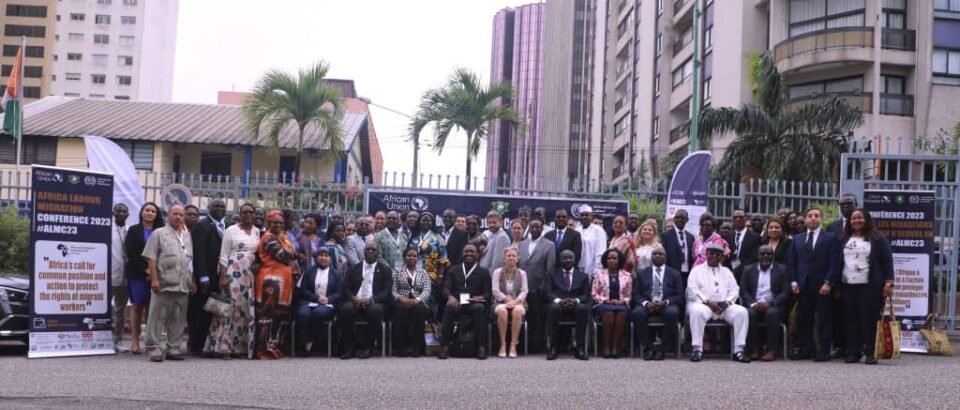- AUC, trade unions, others commit to take actions for better migration governance
By Michael Oche
African governments under the umbrella of the African Union (AU), as well as workers organisations in Africa under the umbrella of ITUC-AFRICA and the International Organization for Employers (IOE) have all recommitted to taking urgent action that will improve the human and labour rights of African migrant workers.
The commitment from the tripartite stakeholders was secured at the Africa Labour Migration Conference (ALMC) which kicked off on Wednesday in Abidjan, the capital of Côte d’Ivoire.
The tripartite stakeholders agreed that the time for fair conversations and firm commitments to improve labour migration governance in Africa is now.
The new plan includes a host of measures for managing migration, with focus on fostering dialogue, cooperation & consensus building on labour migration governance that will lead to protection of the rights of African migrant workers.
“There is a lot to gain from migrant workers by ensuring a stronger, more resilient, more influential Africa that speaks with a collective voice,” ILO Regional director for Africa, Ms Fanfan Ryanyindo Kayiyangwa said at the opening of the ALMC.
The conference which is the first of its kind, is organised by the African Union Commission in collaboration with ITUC-AFRICA and IOE and with technical support from the ILO.
An estimated 14.5 million African migrants are in work, often vulnerable. Their numbers are likely to increase, according to the International Labour Organization (ILO).
“Migration pathways continue to be limited, with precarious living and working conditions for migrant workers and their families. Many African migrant workers don’t enjoy basic human and labour rights, leading to high level inequalities and decent work deficits,” Ms Kayiyangwa noted.
To address these challenges, the ILO Regional director said actions must be taken for effective collaboration among countries of origin, adhering to international standards and addressing challenges while engaging in dialogue with countries of destination.
“We need to do more, better and collectively to ensure decent work outcomes for migrant workers within and from the continent” adding that “such an approach can contribute to fair and equitable migration practices and improved working conditions for migrant workers.”
She also said greater emphasis should be placed on ensuring that the laws and policies are followed up with implementation at all levels of governance for improved decent work outcomes for migrant workers.
Importantly, Ms Fanfan Ryanyindo Kayiyangwa said African countries need to facilitate legal pathways for migrant workers, including within the domestic labour market, under the framework of free movement of persons in accordance with the stipulation of international, continental, regional and bilateral standards
However, she said, “Despite all actions and frameworks, we remain with significant implementation gaps. We need to acknowledge that progress does not translate sufficiently into decent work for migrant workers.”
What is AU, Trade Unions’ doing to improve the situation going forward?
To address the challenge, Mr. Sabelo Mbokazi, Head of Labour, Employment and Migration Division of the African Union Commission (AUC), said African countries must collaborate to promote decent jobs for African and also to correct the wrong narrative of labour migration from the continent which often leads to marginalisation and exploitation.
“It is our considered view and almost our conviction that unless we work together to create decent work in Africa, the African Union vision to be an integrated, peaceful and prosperous Africa will remain a pipe dream,” he said.
Mr Mbokazi pointed to what he described as the horrors of irregular migration from Africa being portrayed through the Mediterranean sea, noting that this is contrary to reality.
He said, “Most of African migrants are not crossing the oceans, but rather crossing the border. It is important for me to remind all of us that in terms of the statistics that we have, only 20% of migrants are crossing the sea with an aspiration to go abroad, but 80% are moving within the continent.
“The narrative on migration and labour migration in Africa should be a narrative that is based on facts and based on the data that we have so that we do not have an overexaggerated of African migrants that are crossing the sea as if the entire continent is trying to cross the oceans to go to Europe. That is a fallacy.”
“It is our duty to be able to provide factual narrative about the African migration and labour migration.
The risks and vulnerability faced by African migrants workers also include unfair recruitment practices, abuse and exploitation by employers, corrupt bureaucrats and criminal gangs.
But Mbokazi argued that “migration is not a problem to be solved in Africa, but it’s an opportunity.”
He said, a well managed labour migration has the potential to yield significant benefits to origin and destination countries, adding that “That is why one of the objectives of the joint labour migration programme is to ensure that migrant workers both in formal and informal sectors enjoy safe and secure working environments and have access to social protection and the mutual recognition of the skills and qualification.”
The challenges offer an opportunity for introspection
Joel Odigie, the Deputy General Secretary of ITUC-AFRICA highlighted that a lot has changed within the African continent in the last twenty on labour migration governance discussion.
He said, “20 years ago, we were not talking about the rights of migrant workers. But today it is on the front burner. It is an issue we are in agreement to discuss.”
For Joel Odigie, there has been progress, but it has been slow and there is an urgent need to rethink skills development fair recruitment processes, among others for African migrant workers
He said, “Even while we have made all this progress, our analysis has shown that the progress are rather slow. The progress before now has not been very inclusive. And the sustainability of the progress has suffered reversal several times. So in terms of scale, in terms of scope, and in terms of space. There is an urgency to move on all these counts.”
He said further “We are saying that yes, labour migration contributes to development. If we really must take advantage of that. There is an urgency on our path as a people and continent to rethink skills development. We need to do this together to improve the labour market in terms of new skills.
“What will it mean at this stage if we cannot protect workers, and that is the beauty of this conference.”
Odigie tasked African leaders to go beyond ratification of ILO standards on labour migration and ensure they enforce and implement such standards.
A total of 80 Tripartite delegations from Cameroon, Cote d’Ivoire, Ethiopia, Ghana, Kenya, Malawi, Morocco, Nigeria,
Somalia, SouthSudan, Uganda, Tunisia, Egypt, Tanzania, Chad are attending the ALMC



